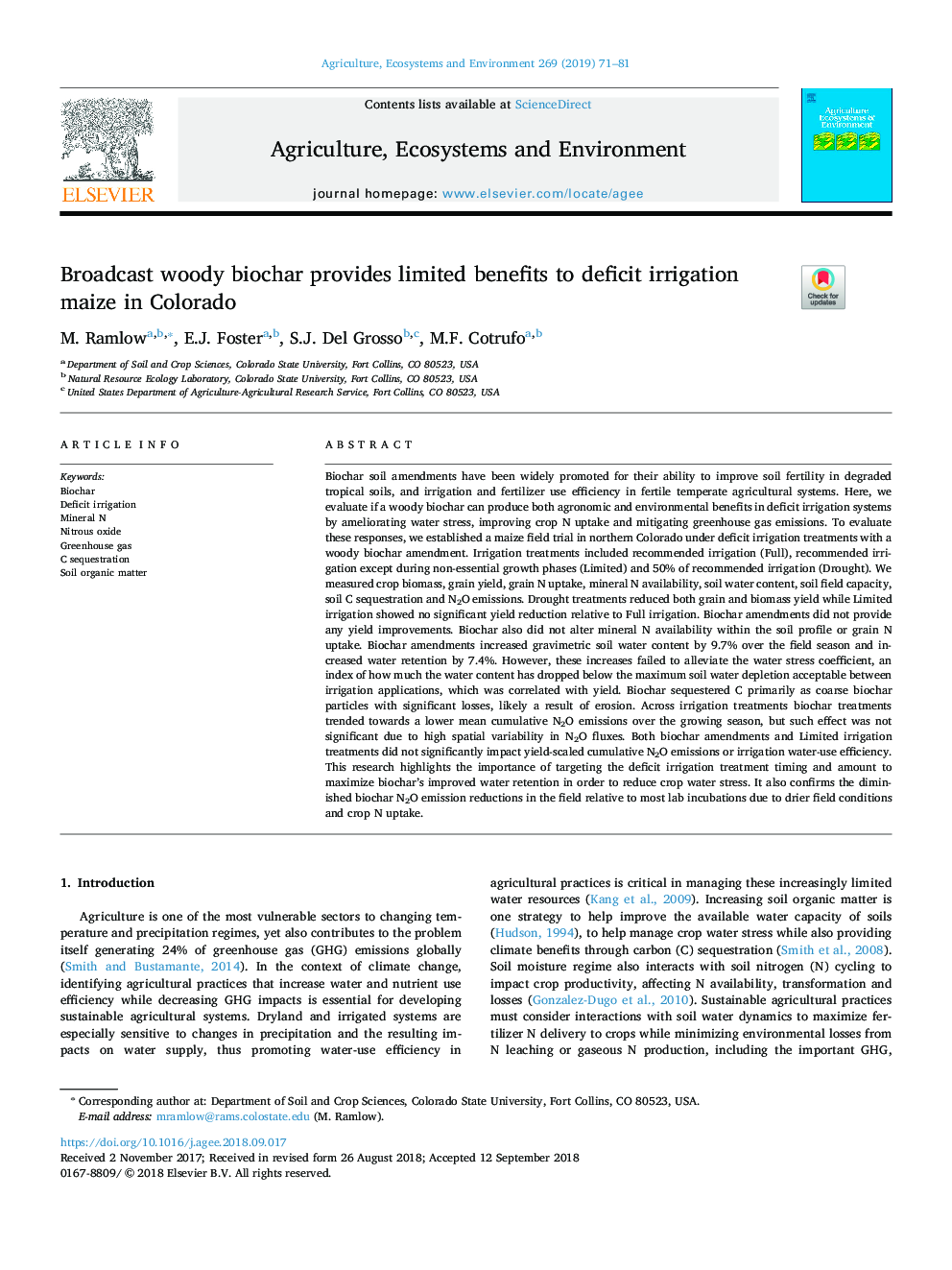| کد مقاله | کد نشریه | سال انتشار | مقاله انگلیسی | نسخه تمام متن |
|---|---|---|---|---|
| 10970595 | 1104192 | 2019 | 11 صفحه PDF | دانلود رایگان |
عنوان انگلیسی مقاله ISI
Broadcast woody biochar provides limited benefits to deficit irrigation maize in Colorado
ترجمه فارسی عنوان
پخش زیست شناسی چوب زراعی مزایای محدود برای ذرت آبیاری کمبود در کلرادو را فراهم می کند
دانلود مقاله + سفارش ترجمه
دانلود مقاله ISI انگلیسی
رایگان برای ایرانیان
کلمات کلیدی
موضوعات مرتبط
علوم زیستی و بیوفناوری
علوم کشاورزی و بیولوژیک
علوم زراعت و اصلاح نباتات
چکیده انگلیسی
Biochar soil amendments have been widely promoted for their ability to improve soil fertility in degraded tropical soils, and irrigation and fertilizer use efficiency in fertile temperate agricultural systems. Here, we evaluate if a woody biochar can produce both agronomic and environmental benefits in deficit irrigation systems by ameliorating water stress, improving crop N uptake and mitigating greenhouse gas emissions. To evaluate these responses, we established a maize field trial in northern Colorado under deficit irrigation treatments with a woody biochar amendment. Irrigation treatments included recommended irrigation (Full), recommended irrigation except during non-essential growth phases (Limited) and 50% of recommended irrigation (Drought). We measured crop biomass, grain yield, grain N uptake, mineral N availability, soil water content, soil field capacity, soil C sequestration and N2O emissions. Drought treatments reduced both grain and biomass yield while Limited irrigation showed no significant yield reduction relative to Full irrigation. Biochar amendments did not provide any yield improvements. Biochar also did not alter mineral N availability within the soil profile or grain N uptake. Biochar amendments increased gravimetric soil water content by 9.7% over the field season and increased water retention by 7.4%. However, these increases failed to alleviate the water stress coefficient, an index of how much the water content has dropped below the maximum soil water depletion acceptable between irrigation applications, which was correlated with yield. Biochar sequestered C primarily as coarse biochar particles with significant losses, likely a result of erosion. Across irrigation treatments biochar treatments trended towards a lower mean cumulative N2O emissions over the growing season, but such effect was not significant due to high spatial variability in N2O fluxes. Both biochar amendments and Limited irrigation treatments did not significantly impact yield-scaled cumulative N2O emissions or irrigation water-use efficiency. This research highlights the importance of targeting the deficit irrigation treatment timing and amount to maximize biochar's improved water retention in order to reduce crop water stress. It also confirms the diminished biochar N2O emission reductions in the field relative to most lab incubations due to drier field conditions and crop N uptake.
ناشر
Database: Elsevier - ScienceDirect (ساینس دایرکت)
Journal: Agriculture, Ecosystems & Environment - Volume 269, 1 January 2019, Pages 71-81
Journal: Agriculture, Ecosystems & Environment - Volume 269, 1 January 2019, Pages 71-81
نویسندگان
M. Ramlow, E.J. Foster, S.J. Del Grosso, M.F. Cotrufo,
